Politics and Culture: Analysis of Political and Cultural Influences
VerifiedAdded on 2023/06/11
|9
|2372
|443
Literature Review
AI Summary
This paper examines the intricate relationship between politics and culture, focusing on their specific influences on society. It highlights how political systems must align with cultural values to govern effectively, and how cultural practices can promote good governance. The paper discusses the growing influence of the capitalist economy on culture and governance, and how the internet facilitates the sharing of information and ideas. It also addresses how some influences, such as socialization, are becoming less relevant due to the skepticism arising from differences in social ideology. Furthermore, the paper explores how issues like social responsibility, freedom of speech, and artistic expression are continually changing in a modernizing world, and how contemporary moral issues impact politics and culture. The document includes a theoretical model which links the antecedent conditions, factors and influences and outcomes to the major sporting event. The model is used to examine and discusses the political and cultural relationships. The diagrammatic representation also demonstrates the relationship and impact of the political and cultural issues along with the nature.
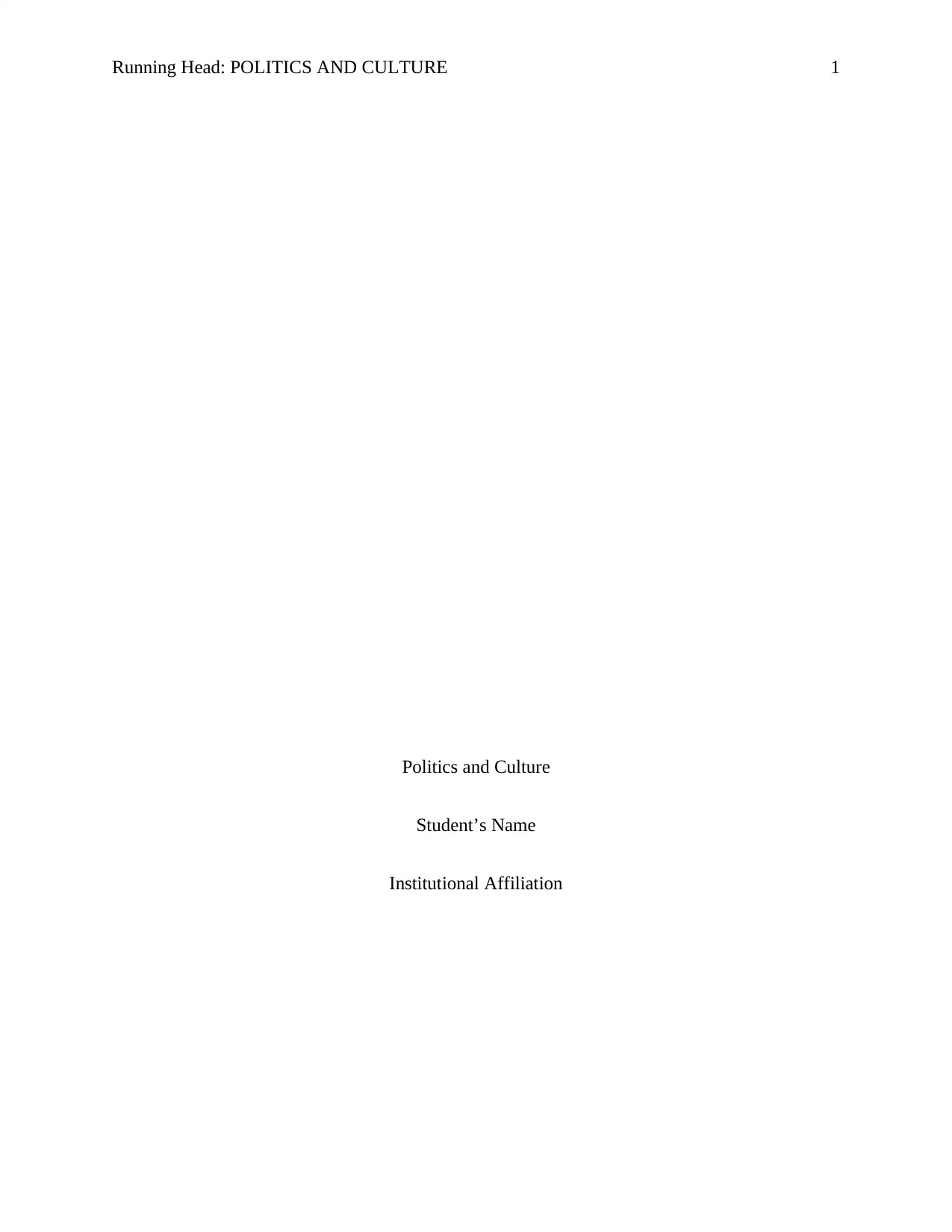
Running Head: POLITICS AND CULTURE 1
Politics and Culture
Student’s Name
Institutional Affiliation
Politics and Culture
Student’s Name
Institutional Affiliation
Paraphrase This Document
Need a fresh take? Get an instant paraphrase of this document with our AI Paraphraser
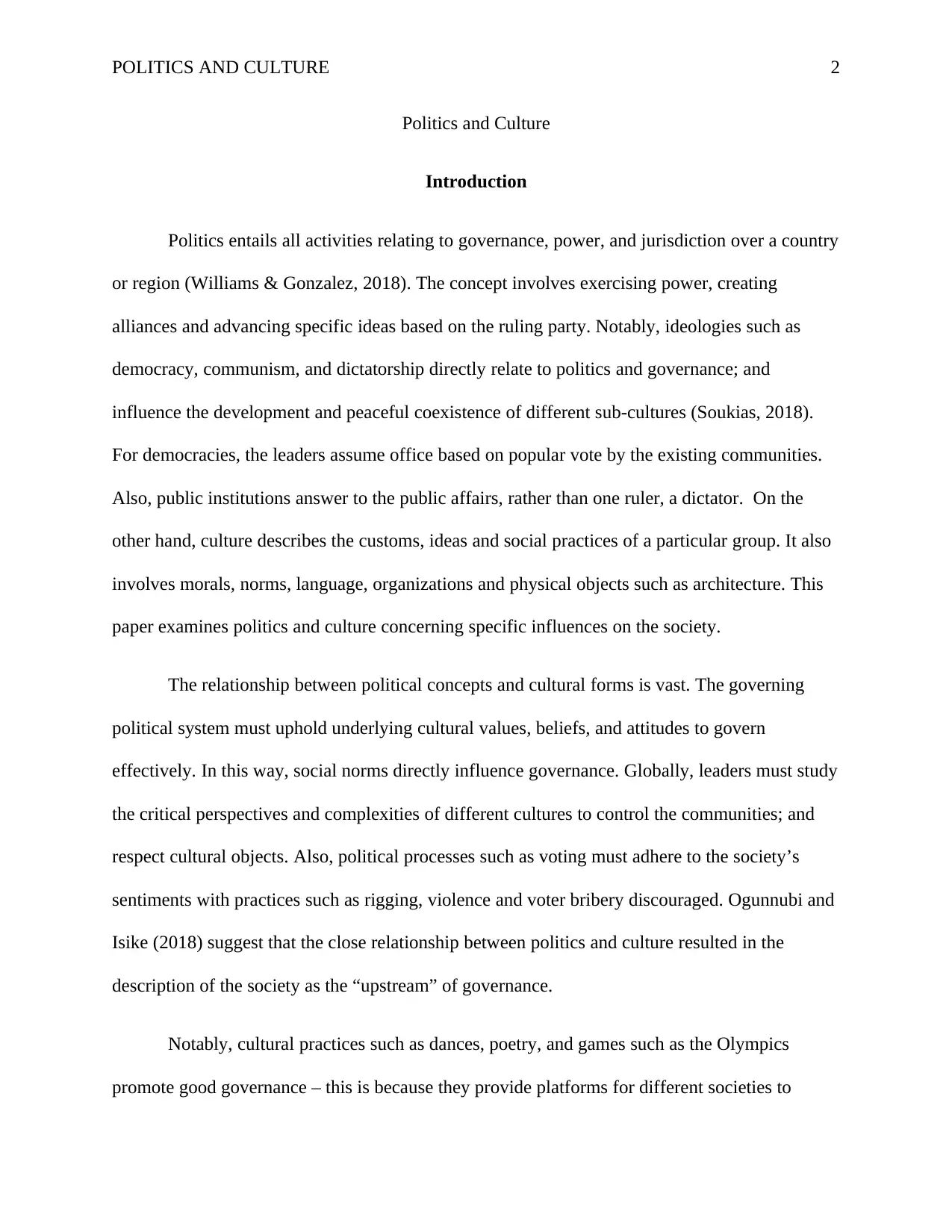
POLITICS AND CULTURE 2
Politics and Culture
Introduction
Politics entails all activities relating to governance, power, and jurisdiction over a country
or region (Williams & Gonzalez, 2018). The concept involves exercising power, creating
alliances and advancing specific ideas based on the ruling party. Notably, ideologies such as
democracy, communism, and dictatorship directly relate to politics and governance; and
influence the development and peaceful coexistence of different sub-cultures (Soukias, 2018).
For democracies, the leaders assume office based on popular vote by the existing communities.
Also, public institutions answer to the public affairs, rather than one ruler, a dictator. On the
other hand, culture describes the customs, ideas and social practices of a particular group. It also
involves morals, norms, language, organizations and physical objects such as architecture. This
paper examines politics and culture concerning specific influences on the society.
The relationship between political concepts and cultural forms is vast. The governing
political system must uphold underlying cultural values, beliefs, and attitudes to govern
effectively. In this way, social norms directly influence governance. Globally, leaders must study
the critical perspectives and complexities of different cultures to control the communities; and
respect cultural objects. Also, political processes such as voting must adhere to the society’s
sentiments with practices such as rigging, violence and voter bribery discouraged. Ogunnubi and
Isike (2018) suggest that the close relationship between politics and culture resulted in the
description of the society as the “upstream” of governance.
Notably, cultural practices such as dances, poetry, and games such as the Olympics
promote good governance – this is because they provide platforms for different societies to
Politics and Culture
Introduction
Politics entails all activities relating to governance, power, and jurisdiction over a country
or region (Williams & Gonzalez, 2018). The concept involves exercising power, creating
alliances and advancing specific ideas based on the ruling party. Notably, ideologies such as
democracy, communism, and dictatorship directly relate to politics and governance; and
influence the development and peaceful coexistence of different sub-cultures (Soukias, 2018).
For democracies, the leaders assume office based on popular vote by the existing communities.
Also, public institutions answer to the public affairs, rather than one ruler, a dictator. On the
other hand, culture describes the customs, ideas and social practices of a particular group. It also
involves morals, norms, language, organizations and physical objects such as architecture. This
paper examines politics and culture concerning specific influences on the society.
The relationship between political concepts and cultural forms is vast. The governing
political system must uphold underlying cultural values, beliefs, and attitudes to govern
effectively. In this way, social norms directly influence governance. Globally, leaders must study
the critical perspectives and complexities of different cultures to control the communities; and
respect cultural objects. Also, political processes such as voting must adhere to the society’s
sentiments with practices such as rigging, violence and voter bribery discouraged. Ogunnubi and
Isike (2018) suggest that the close relationship between politics and culture resulted in the
description of the society as the “upstream” of governance.
Notably, cultural practices such as dances, poetry, and games such as the Olympics
promote good governance – this is because they provide platforms for different societies to
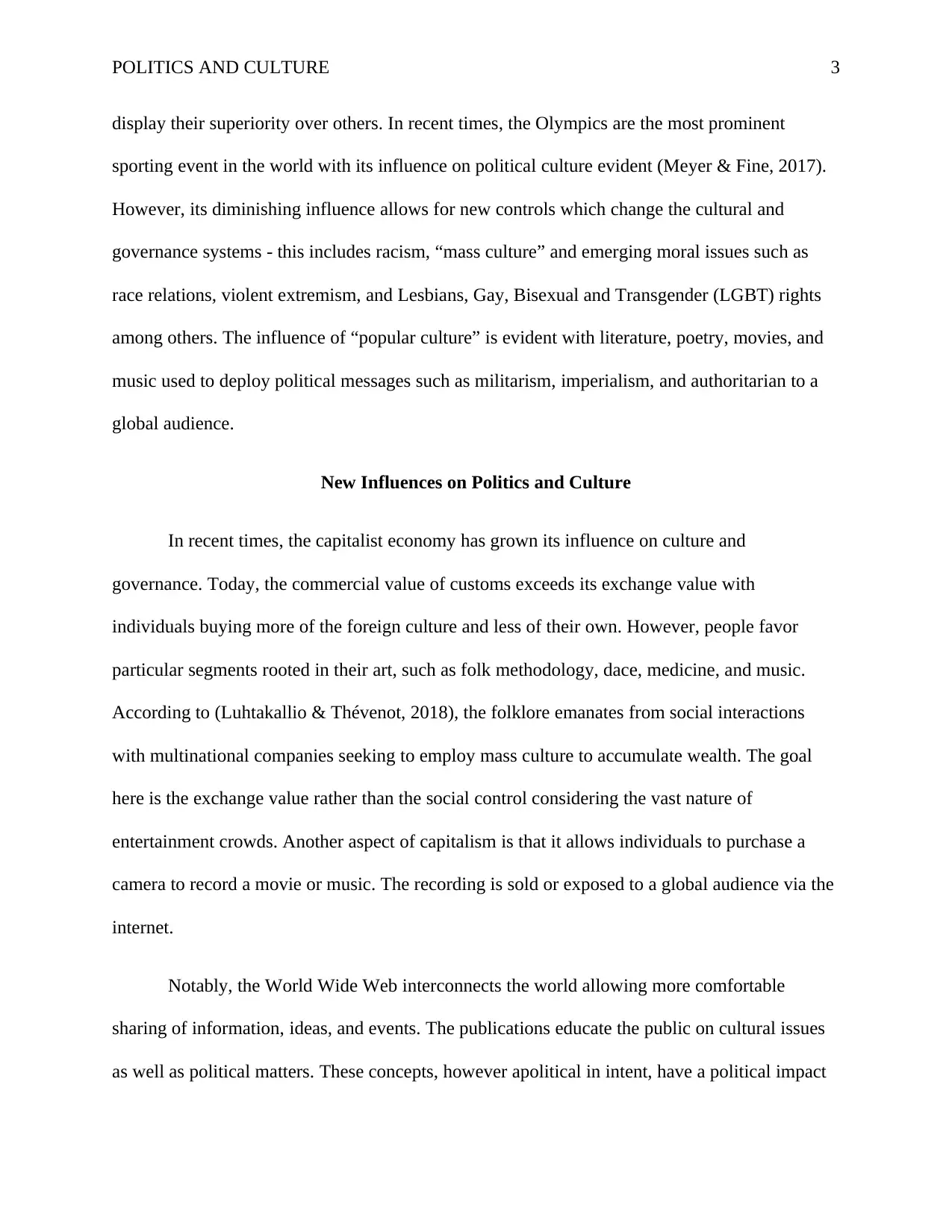
POLITICS AND CULTURE 3
display their superiority over others. In recent times, the Olympics are the most prominent
sporting event in the world with its influence on political culture evident (Meyer & Fine, 2017).
However, its diminishing influence allows for new controls which change the cultural and
governance systems - this includes racism, “mass culture” and emerging moral issues such as
race relations, violent extremism, and Lesbians, Gay, Bisexual and Transgender (LGBT) rights
among others. The influence of “popular culture” is evident with literature, poetry, movies, and
music used to deploy political messages such as militarism, imperialism, and authoritarian to a
global audience.
New Influences on Politics and Culture
In recent times, the capitalist economy has grown its influence on culture and
governance. Today, the commercial value of customs exceeds its exchange value with
individuals buying more of the foreign culture and less of their own. However, people favor
particular segments rooted in their art, such as folk methodology, dace, medicine, and music.
According to (Luhtakallio & Thévenot, 2018), the folklore emanates from social interactions
with multinational companies seeking to employ mass culture to accumulate wealth. The goal
here is the exchange value rather than the social control considering the vast nature of
entertainment crowds. Another aspect of capitalism is that it allows individuals to purchase a
camera to record a movie or music. The recording is sold or exposed to a global audience via the
internet.
Notably, the World Wide Web interconnects the world allowing more comfortable
sharing of information, ideas, and events. The publications educate the public on cultural issues
as well as political matters. These concepts, however apolitical in intent, have a political impact
display their superiority over others. In recent times, the Olympics are the most prominent
sporting event in the world with its influence on political culture evident (Meyer & Fine, 2017).
However, its diminishing influence allows for new controls which change the cultural and
governance systems - this includes racism, “mass culture” and emerging moral issues such as
race relations, violent extremism, and Lesbians, Gay, Bisexual and Transgender (LGBT) rights
among others. The influence of “popular culture” is evident with literature, poetry, movies, and
music used to deploy political messages such as militarism, imperialism, and authoritarian to a
global audience.
New Influences on Politics and Culture
In recent times, the capitalist economy has grown its influence on culture and
governance. Today, the commercial value of customs exceeds its exchange value with
individuals buying more of the foreign culture and less of their own. However, people favor
particular segments rooted in their art, such as folk methodology, dace, medicine, and music.
According to (Luhtakallio & Thévenot, 2018), the folklore emanates from social interactions
with multinational companies seeking to employ mass culture to accumulate wealth. The goal
here is the exchange value rather than the social control considering the vast nature of
entertainment crowds. Another aspect of capitalism is that it allows individuals to purchase a
camera to record a movie or music. The recording is sold or exposed to a global audience via the
internet.
Notably, the World Wide Web interconnects the world allowing more comfortable
sharing of information, ideas, and events. The publications educate the public on cultural issues
as well as political matters. These concepts, however apolitical in intent, have a political impact
⊘ This is a preview!⊘
Do you want full access?
Subscribe today to unlock all pages.

Trusted by 1+ million students worldwide
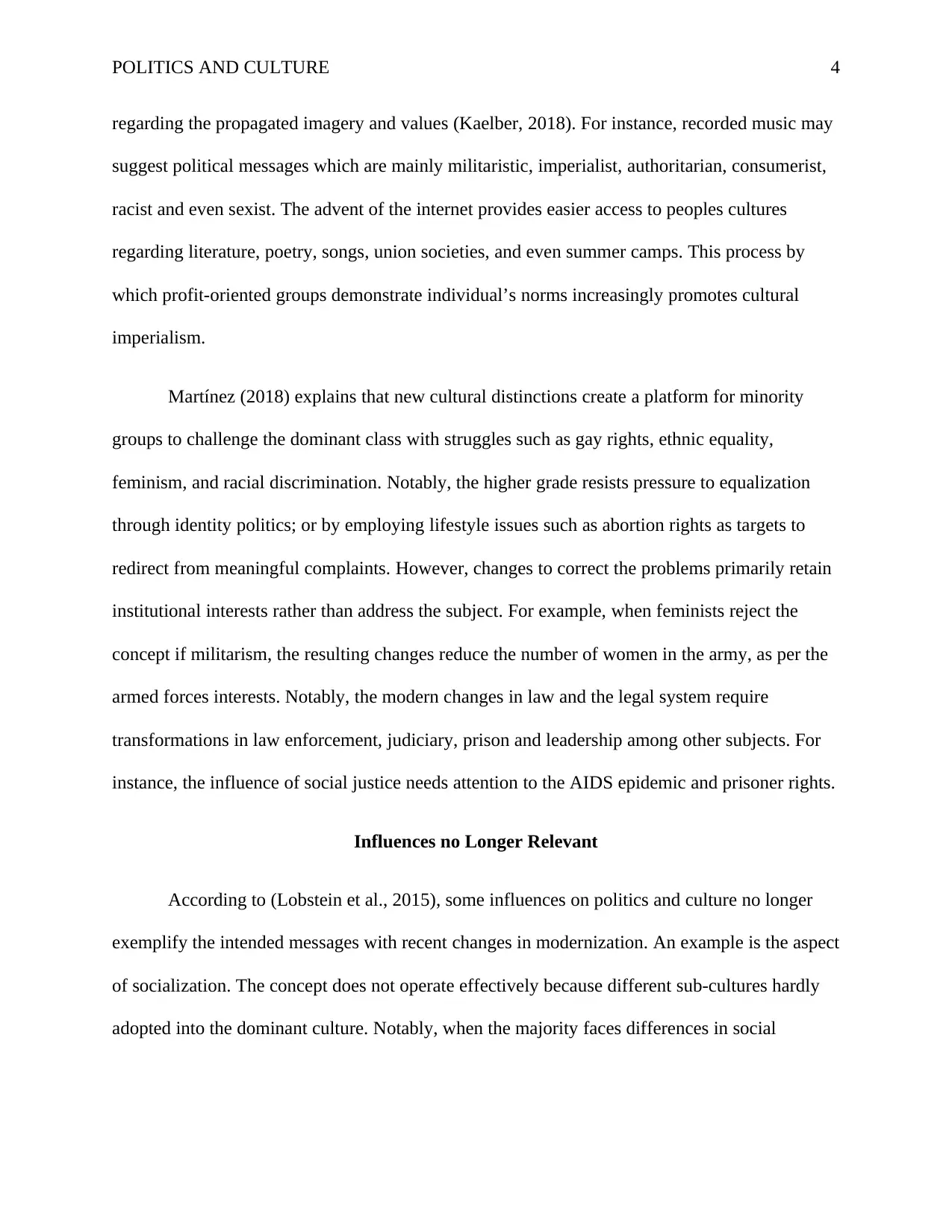
POLITICS AND CULTURE 4
regarding the propagated imagery and values (Kaelber, 2018). For instance, recorded music may
suggest political messages which are mainly militaristic, imperialist, authoritarian, consumerist,
racist and even sexist. The advent of the internet provides easier access to peoples cultures
regarding literature, poetry, songs, union societies, and even summer camps. This process by
which profit-oriented groups demonstrate individual’s norms increasingly promotes cultural
imperialism.
Martínez (2018) explains that new cultural distinctions create a platform for minority
groups to challenge the dominant class with struggles such as gay rights, ethnic equality,
feminism, and racial discrimination. Notably, the higher grade resists pressure to equalization
through identity politics; or by employing lifestyle issues such as abortion rights as targets to
redirect from meaningful complaints. However, changes to correct the problems primarily retain
institutional interests rather than address the subject. For example, when feminists reject the
concept if militarism, the resulting changes reduce the number of women in the army, as per the
armed forces interests. Notably, the modern changes in law and the legal system require
transformations in law enforcement, judiciary, prison and leadership among other subjects. For
instance, the influence of social justice needs attention to the AIDS epidemic and prisoner rights.
Influences no Longer Relevant
According to (Lobstein et al., 2015), some influences on politics and culture no longer
exemplify the intended messages with recent changes in modernization. An example is the aspect
of socialization. The concept does not operate effectively because different sub-cultures hardly
adopted into the dominant culture. Notably, when the majority faces differences in social
regarding the propagated imagery and values (Kaelber, 2018). For instance, recorded music may
suggest political messages which are mainly militaristic, imperialist, authoritarian, consumerist,
racist and even sexist. The advent of the internet provides easier access to peoples cultures
regarding literature, poetry, songs, union societies, and even summer camps. This process by
which profit-oriented groups demonstrate individual’s norms increasingly promotes cultural
imperialism.
Martínez (2018) explains that new cultural distinctions create a platform for minority
groups to challenge the dominant class with struggles such as gay rights, ethnic equality,
feminism, and racial discrimination. Notably, the higher grade resists pressure to equalization
through identity politics; or by employing lifestyle issues such as abortion rights as targets to
redirect from meaningful complaints. However, changes to correct the problems primarily retain
institutional interests rather than address the subject. For example, when feminists reject the
concept if militarism, the resulting changes reduce the number of women in the army, as per the
armed forces interests. Notably, the modern changes in law and the legal system require
transformations in law enforcement, judiciary, prison and leadership among other subjects. For
instance, the influence of social justice needs attention to the AIDS epidemic and prisoner rights.
Influences no Longer Relevant
According to (Lobstein et al., 2015), some influences on politics and culture no longer
exemplify the intended messages with recent changes in modernization. An example is the aspect
of socialization. The concept does not operate effectively because different sub-cultures hardly
adopted into the dominant culture. Notably, when the majority faces differences in social
Paraphrase This Document
Need a fresh take? Get an instant paraphrase of this document with our AI Paraphraser
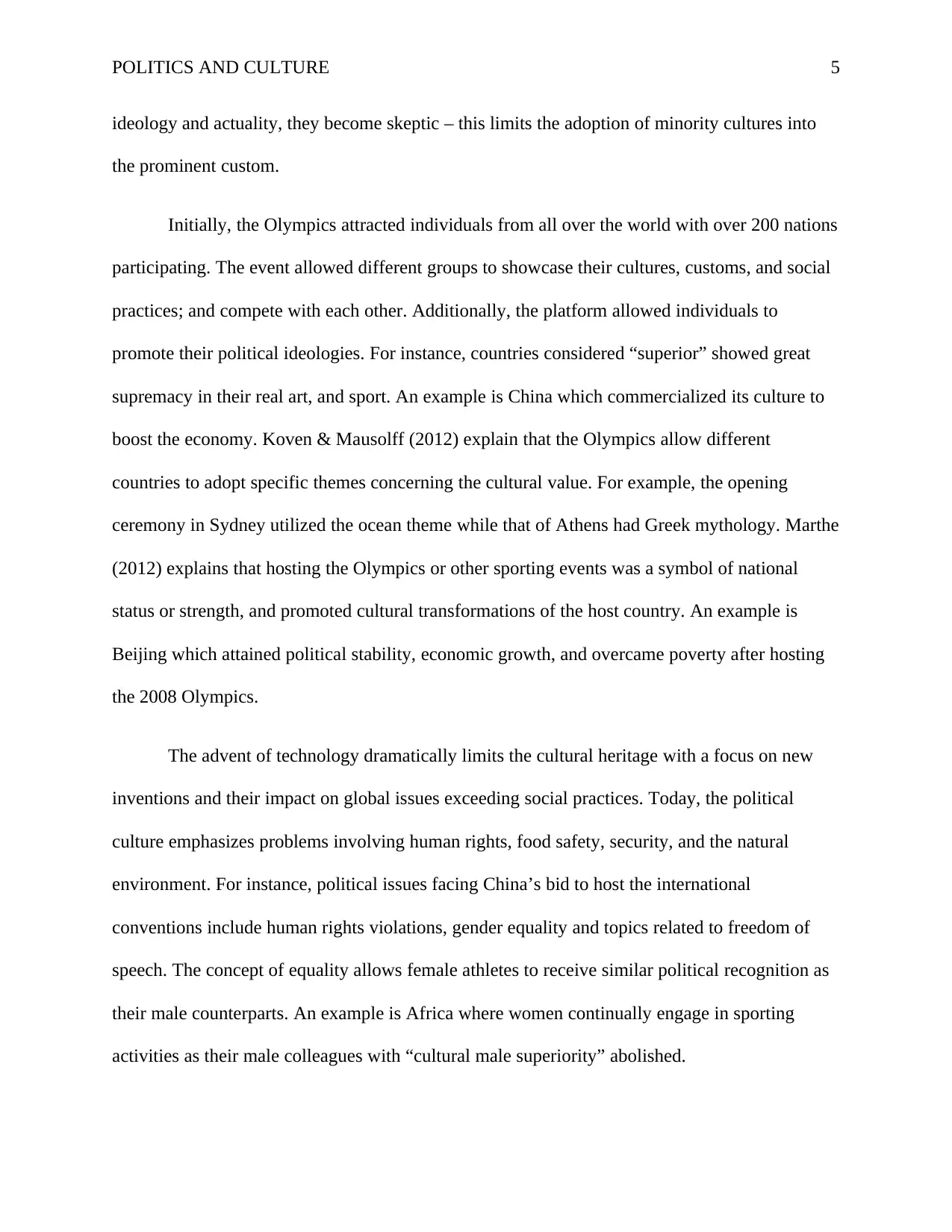
POLITICS AND CULTURE 5
ideology and actuality, they become skeptic – this limits the adoption of minority cultures into
the prominent custom.
Initially, the Olympics attracted individuals from all over the world with over 200 nations
participating. The event allowed different groups to showcase their cultures, customs, and social
practices; and compete with each other. Additionally, the platform allowed individuals to
promote their political ideologies. For instance, countries considered “superior” showed great
supremacy in their real art, and sport. An example is China which commercialized its culture to
boost the economy. Koven & Mausolff (2012) explain that the Olympics allow different
countries to adopt specific themes concerning the cultural value. For example, the opening
ceremony in Sydney utilized the ocean theme while that of Athens had Greek mythology. Marthe
(2012) explains that hosting the Olympics or other sporting events was a symbol of national
status or strength, and promoted cultural transformations of the host country. An example is
Beijing which attained political stability, economic growth, and overcame poverty after hosting
the 2008 Olympics.
The advent of technology dramatically limits the cultural heritage with a focus on new
inventions and their impact on global issues exceeding social practices. Today, the political
culture emphasizes problems involving human rights, food safety, security, and the natural
environment. For instance, political issues facing China’s bid to host the international
conventions include human rights violations, gender equality and topics related to freedom of
speech. The concept of equality allows female athletes to receive similar political recognition as
their male counterparts. An example is Africa where women continually engage in sporting
activities as their male colleagues with “cultural male superiority” abolished.
ideology and actuality, they become skeptic – this limits the adoption of minority cultures into
the prominent custom.
Initially, the Olympics attracted individuals from all over the world with over 200 nations
participating. The event allowed different groups to showcase their cultures, customs, and social
practices; and compete with each other. Additionally, the platform allowed individuals to
promote their political ideologies. For instance, countries considered “superior” showed great
supremacy in their real art, and sport. An example is China which commercialized its culture to
boost the economy. Koven & Mausolff (2012) explain that the Olympics allow different
countries to adopt specific themes concerning the cultural value. For example, the opening
ceremony in Sydney utilized the ocean theme while that of Athens had Greek mythology. Marthe
(2012) explains that hosting the Olympics or other sporting events was a symbol of national
status or strength, and promoted cultural transformations of the host country. An example is
Beijing which attained political stability, economic growth, and overcame poverty after hosting
the 2008 Olympics.
The advent of technology dramatically limits the cultural heritage with a focus on new
inventions and their impact on global issues exceeding social practices. Today, the political
culture emphasizes problems involving human rights, food safety, security, and the natural
environment. For instance, political issues facing China’s bid to host the international
conventions include human rights violations, gender equality and topics related to freedom of
speech. The concept of equality allows female athletes to receive similar political recognition as
their male counterparts. An example is Africa where women continually engage in sporting
activities as their male colleagues with “cultural male superiority” abolished.
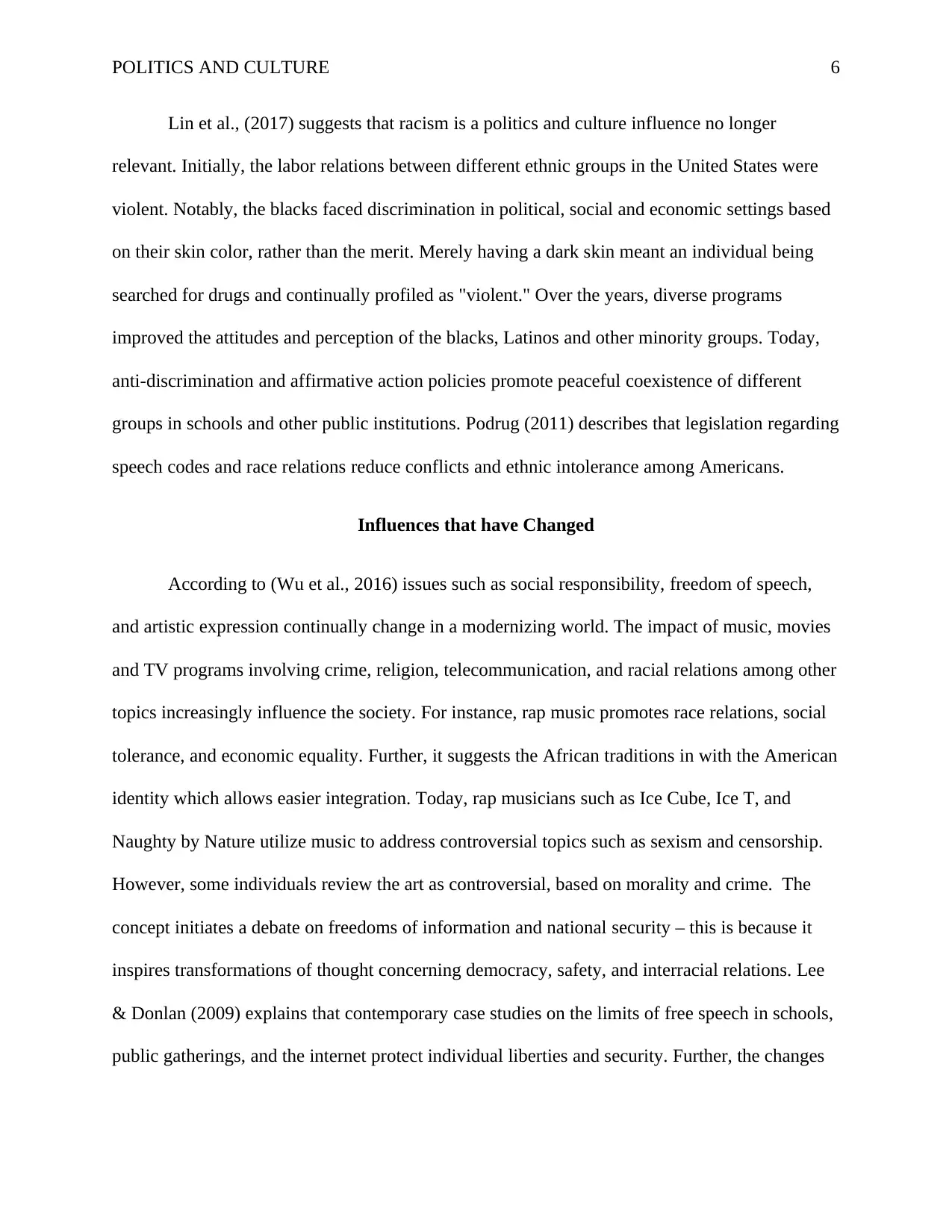
POLITICS AND CULTURE 6
Lin et al., (2017) suggests that racism is a politics and culture influence no longer
relevant. Initially, the labor relations between different ethnic groups in the United States were
violent. Notably, the blacks faced discrimination in political, social and economic settings based
on their skin color, rather than the merit. Merely having a dark skin meant an individual being
searched for drugs and continually profiled as "violent." Over the years, diverse programs
improved the attitudes and perception of the blacks, Latinos and other minority groups. Today,
anti-discrimination and affirmative action policies promote peaceful coexistence of different
groups in schools and other public institutions. Podrug (2011) describes that legislation regarding
speech codes and race relations reduce conflicts and ethnic intolerance among Americans.
Influences that have Changed
According to (Wu et al., 2016) issues such as social responsibility, freedom of speech,
and artistic expression continually change in a modernizing world. The impact of music, movies
and TV programs involving crime, religion, telecommunication, and racial relations among other
topics increasingly influence the society. For instance, rap music promotes race relations, social
tolerance, and economic equality. Further, it suggests the African traditions in with the American
identity which allows easier integration. Today, rap musicians such as Ice Cube, Ice T, and
Naughty by Nature utilize music to address controversial topics such as sexism and censorship.
However, some individuals review the art as controversial, based on morality and crime. The
concept initiates a debate on freedoms of information and national security – this is because it
inspires transformations of thought concerning democracy, safety, and interracial relations. Lee
& Donlan (2009) explains that contemporary case studies on the limits of free speech in schools,
public gatherings, and the internet protect individual liberties and security. Further, the changes
Lin et al., (2017) suggests that racism is a politics and culture influence no longer
relevant. Initially, the labor relations between different ethnic groups in the United States were
violent. Notably, the blacks faced discrimination in political, social and economic settings based
on their skin color, rather than the merit. Merely having a dark skin meant an individual being
searched for drugs and continually profiled as "violent." Over the years, diverse programs
improved the attitudes and perception of the blacks, Latinos and other minority groups. Today,
anti-discrimination and affirmative action policies promote peaceful coexistence of different
groups in schools and other public institutions. Podrug (2011) describes that legislation regarding
speech codes and race relations reduce conflicts and ethnic intolerance among Americans.
Influences that have Changed
According to (Wu et al., 2016) issues such as social responsibility, freedom of speech,
and artistic expression continually change in a modernizing world. The impact of music, movies
and TV programs involving crime, religion, telecommunication, and racial relations among other
topics increasingly influence the society. For instance, rap music promotes race relations, social
tolerance, and economic equality. Further, it suggests the African traditions in with the American
identity which allows easier integration. Today, rap musicians such as Ice Cube, Ice T, and
Naughty by Nature utilize music to address controversial topics such as sexism and censorship.
However, some individuals review the art as controversial, based on morality and crime. The
concept initiates a debate on freedoms of information and national security – this is because it
inspires transformations of thought concerning democracy, safety, and interracial relations. Lee
& Donlan (2009) explains that contemporary case studies on the limits of free speech in schools,
public gatherings, and the internet protect individual liberties and security. Further, the changes
⊘ This is a preview!⊘
Do you want full access?
Subscribe today to unlock all pages.

Trusted by 1+ million students worldwide
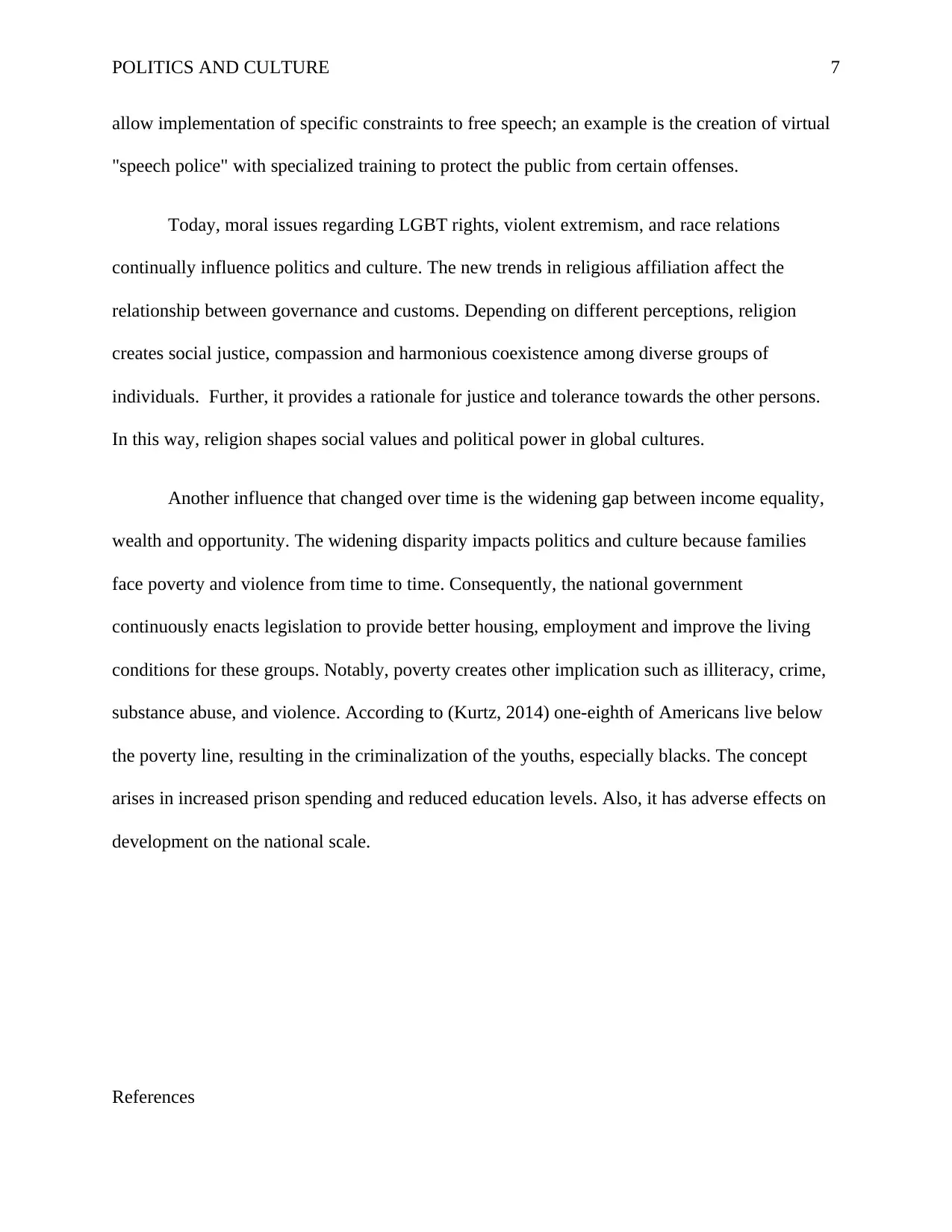
POLITICS AND CULTURE 7
allow implementation of specific constraints to free speech; an example is the creation of virtual
"speech police" with specialized training to protect the public from certain offenses.
Today, moral issues regarding LGBT rights, violent extremism, and race relations
continually influence politics and culture. The new trends in religious affiliation affect the
relationship between governance and customs. Depending on different perceptions, religion
creates social justice, compassion and harmonious coexistence among diverse groups of
individuals. Further, it provides a rationale for justice and tolerance towards the other persons.
In this way, religion shapes social values and political power in global cultures.
Another influence that changed over time is the widening gap between income equality,
wealth and opportunity. The widening disparity impacts politics and culture because families
face poverty and violence from time to time. Consequently, the national government
continuously enacts legislation to provide better housing, employment and improve the living
conditions for these groups. Notably, poverty creates other implication such as illiteracy, crime,
substance abuse, and violence. According to (Kurtz, 2014) one-eighth of Americans live below
the poverty line, resulting in the criminalization of the youths, especially blacks. The concept
arises in increased prison spending and reduced education levels. Also, it has adverse effects on
development on the national scale.
References
allow implementation of specific constraints to free speech; an example is the creation of virtual
"speech police" with specialized training to protect the public from certain offenses.
Today, moral issues regarding LGBT rights, violent extremism, and race relations
continually influence politics and culture. The new trends in religious affiliation affect the
relationship between governance and customs. Depending on different perceptions, religion
creates social justice, compassion and harmonious coexistence among diverse groups of
individuals. Further, it provides a rationale for justice and tolerance towards the other persons.
In this way, religion shapes social values and political power in global cultures.
Another influence that changed over time is the widening gap between income equality,
wealth and opportunity. The widening disparity impacts politics and culture because families
face poverty and violence from time to time. Consequently, the national government
continuously enacts legislation to provide better housing, employment and improve the living
conditions for these groups. Notably, poverty creates other implication such as illiteracy, crime,
substance abuse, and violence. According to (Kurtz, 2014) one-eighth of Americans live below
the poverty line, resulting in the criminalization of the youths, especially blacks. The concept
arises in increased prison spending and reduced education levels. Also, it has adverse effects on
development on the national scale.
References
Paraphrase This Document
Need a fresh take? Get an instant paraphrase of this document with our AI Paraphraser
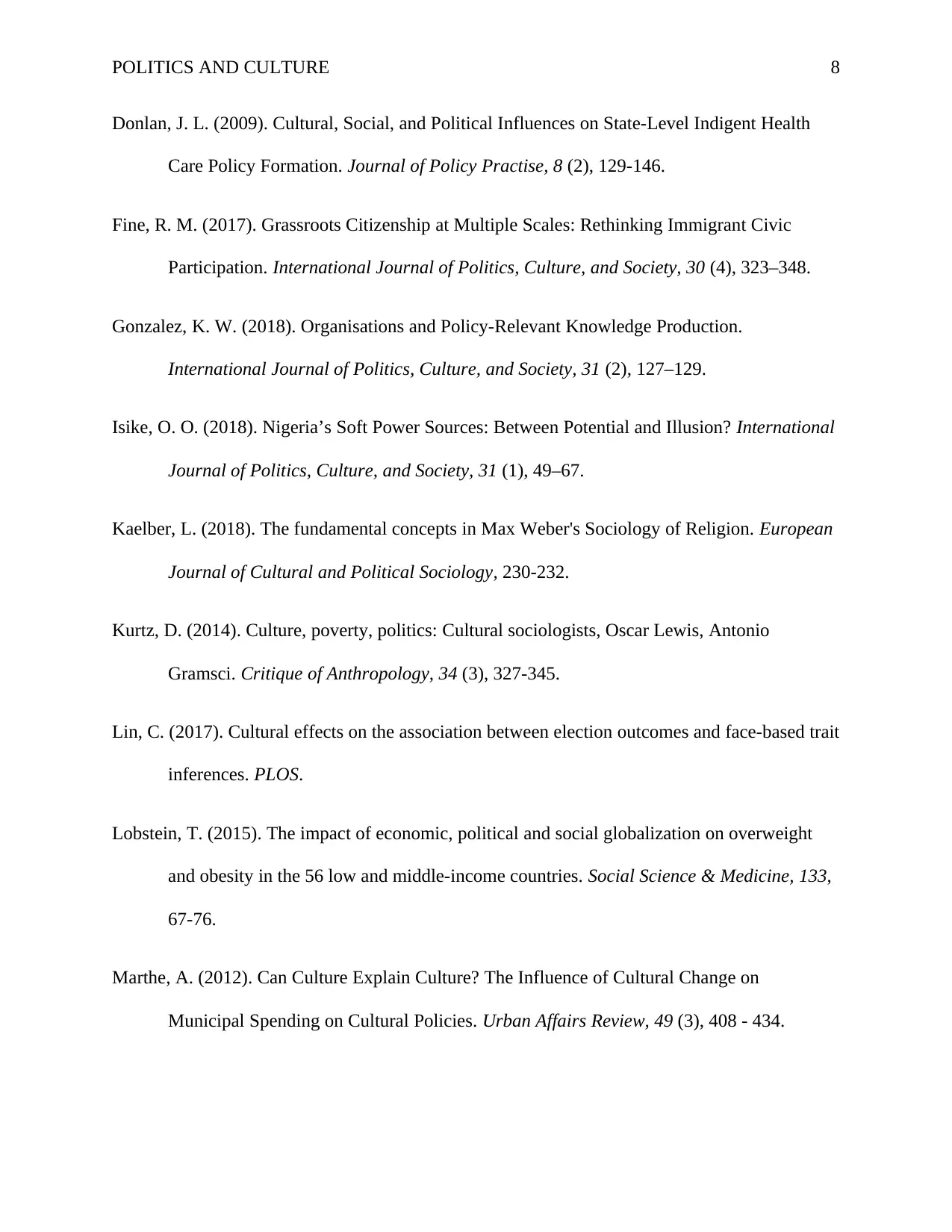
POLITICS AND CULTURE 8
Donlan, J. L. (2009). Cultural, Social, and Political Influences on State-Level Indigent Health
Care Policy Formation. Journal of Policy Practise, 8 (2), 129-146.
Fine, R. M. (2017). Grassroots Citizenship at Multiple Scales: Rethinking Immigrant Civic
Participation. International Journal of Politics, Culture, and Society, 30 (4), 323–348.
Gonzalez, K. W. (2018). Organisations and Policy-Relevant Knowledge Production.
International Journal of Politics, Culture, and Society, 31 (2), 127–129.
Isike, O. O. (2018). Nigeria’s Soft Power Sources: Between Potential and Illusion? International
Journal of Politics, Culture, and Society, 31 (1), 49–67.
Kaelber, L. (2018). The fundamental concepts in Max Weber's Sociology of Religion. European
Journal of Cultural and Political Sociology, 230-232.
Kurtz, D. (2014). Culture, poverty, politics: Cultural sociologists, Oscar Lewis, Antonio
Gramsci. Critique of Anthropology, 34 (3), 327-345.
Lin, C. (2017). Cultural effects on the association between election outcomes and face-based trait
inferences. PLOS.
Lobstein, T. (2015). The impact of economic, political and social globalization on overweight
and obesity in the 56 low and middle-income countries. Social Science & Medicine, 133,
67-76.
Marthe, A. (2012). Can Culture Explain Culture? The Influence of Cultural Change on
Municipal Spending on Cultural Policies. Urban Affairs Review, 49 (3), 408 - 434.
Donlan, J. L. (2009). Cultural, Social, and Political Influences on State-Level Indigent Health
Care Policy Formation. Journal of Policy Practise, 8 (2), 129-146.
Fine, R. M. (2017). Grassroots Citizenship at Multiple Scales: Rethinking Immigrant Civic
Participation. International Journal of Politics, Culture, and Society, 30 (4), 323–348.
Gonzalez, K. W. (2018). Organisations and Policy-Relevant Knowledge Production.
International Journal of Politics, Culture, and Society, 31 (2), 127–129.
Isike, O. O. (2018). Nigeria’s Soft Power Sources: Between Potential and Illusion? International
Journal of Politics, Culture, and Society, 31 (1), 49–67.
Kaelber, L. (2018). The fundamental concepts in Max Weber's Sociology of Religion. European
Journal of Cultural and Political Sociology, 230-232.
Kurtz, D. (2014). Culture, poverty, politics: Cultural sociologists, Oscar Lewis, Antonio
Gramsci. Critique of Anthropology, 34 (3), 327-345.
Lin, C. (2017). Cultural effects on the association between election outcomes and face-based trait
inferences. PLOS.
Lobstein, T. (2015). The impact of economic, political and social globalization on overweight
and obesity in the 56 low and middle-income countries. Social Science & Medicine, 133,
67-76.
Marthe, A. (2012). Can Culture Explain Culture? The Influence of Cultural Change on
Municipal Spending on Cultural Policies. Urban Affairs Review, 49 (3), 408 - 434.
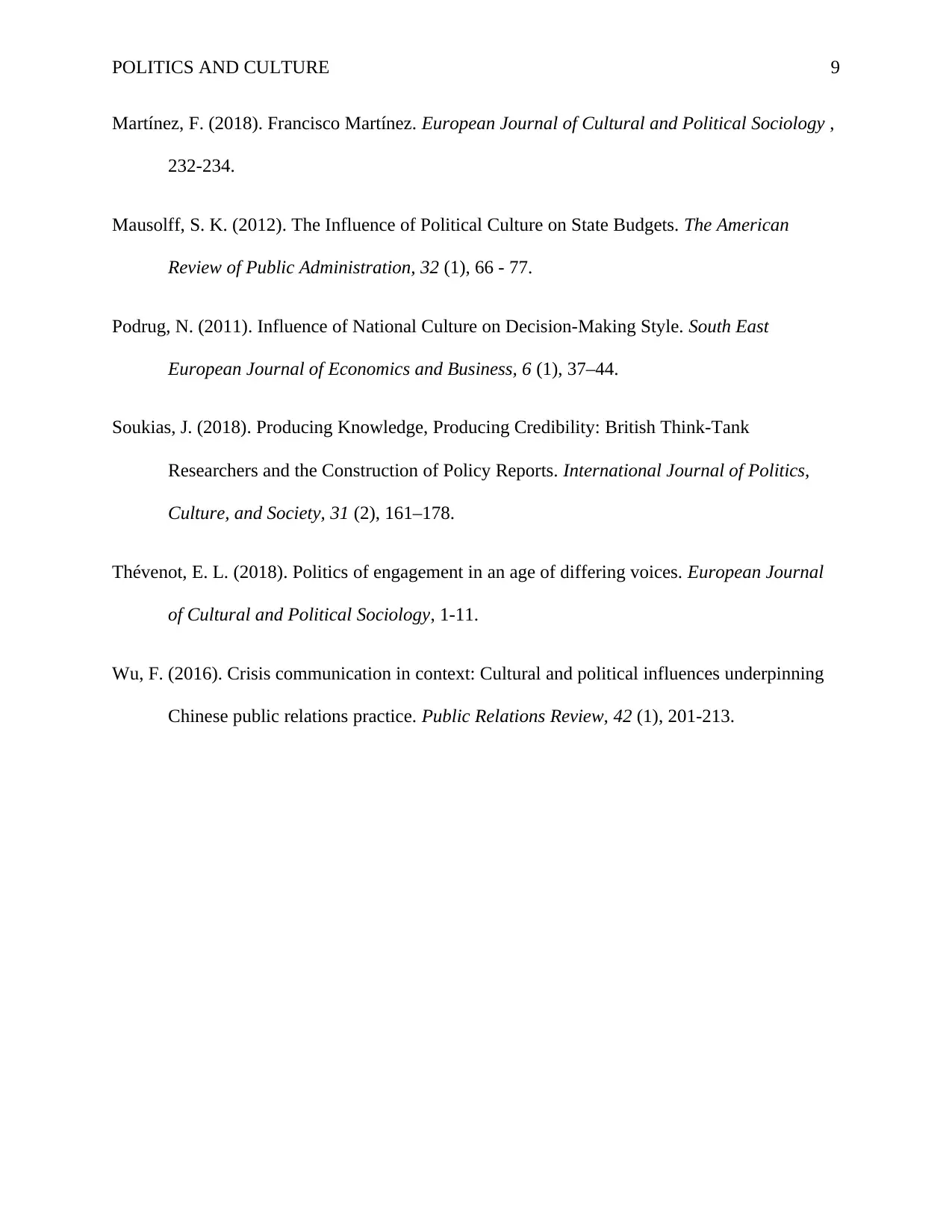
POLITICS AND CULTURE 9
Martínez, F. (2018). Francisco Martínez. European Journal of Cultural and Political Sociology ,
232-234.
Mausolff, S. K. (2012). The Influence of Political Culture on State Budgets. The American
Review of Public Administration, 32 (1), 66 - 77.
Podrug, N. (2011). Influence of National Culture on Decision-Making Style. South East
European Journal of Economics and Business, 6 (1), 37–44.
Soukias, J. (2018). Producing Knowledge, Producing Credibility: British Think-Tank
Researchers and the Construction of Policy Reports. International Journal of Politics,
Culture, and Society, 31 (2), 161–178.
Thévenot, E. L. (2018). Politics of engagement in an age of differing voices. European Journal
of Cultural and Political Sociology, 1-11.
Wu, F. (2016). Crisis communication in context: Cultural and political influences underpinning
Chinese public relations practice. Public Relations Review, 42 (1), 201-213.
Martínez, F. (2018). Francisco Martínez. European Journal of Cultural and Political Sociology ,
232-234.
Mausolff, S. K. (2012). The Influence of Political Culture on State Budgets. The American
Review of Public Administration, 32 (1), 66 - 77.
Podrug, N. (2011). Influence of National Culture on Decision-Making Style. South East
European Journal of Economics and Business, 6 (1), 37–44.
Soukias, J. (2018). Producing Knowledge, Producing Credibility: British Think-Tank
Researchers and the Construction of Policy Reports. International Journal of Politics,
Culture, and Society, 31 (2), 161–178.
Thévenot, E. L. (2018). Politics of engagement in an age of differing voices. European Journal
of Cultural and Political Sociology, 1-11.
Wu, F. (2016). Crisis communication in context: Cultural and political influences underpinning
Chinese public relations practice. Public Relations Review, 42 (1), 201-213.
⊘ This is a preview!⊘
Do you want full access?
Subscribe today to unlock all pages.

Trusted by 1+ million students worldwide
1 out of 9
Your All-in-One AI-Powered Toolkit for Academic Success.
+13062052269
info@desklib.com
Available 24*7 on WhatsApp / Email
![[object Object]](/_next/static/media/star-bottom.7253800d.svg)
Unlock your academic potential
Copyright © 2020–2025 A2Z Services. All Rights Reserved. Developed and managed by ZUCOL.


